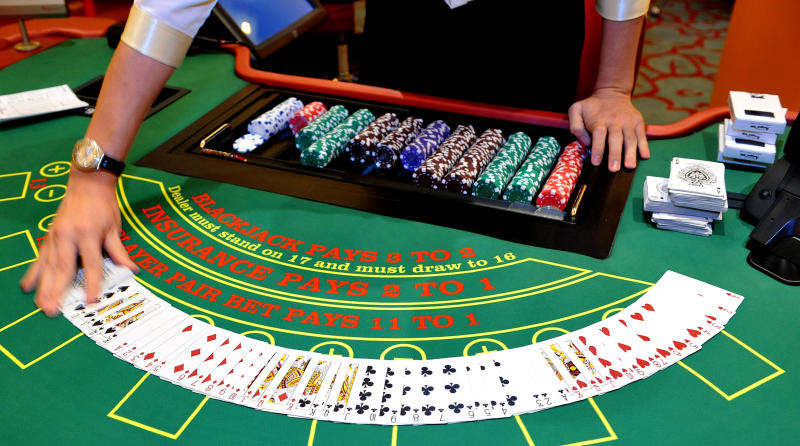Malaysia's govt increases special lottery draws despite Islamist ally's anti-gambling stance
Sign up now: Get ST's newsletters delivered to your inbox

Gambling is prohibited in Islam, and proceeds from gambling are defined as sin tax, along with tobacco and alcohol sales.
ST PHOTO: DESMOND WEE
Follow topic:
KUALA LUMPUR - The Malaysian government has increased special lottery draws to be carried out by gambling firms this year, despite the anti-gambling stance of Islamist party Parti Islam SeMalaysia (PAS), which is part of the ruling Perikatan Nasional (PN) coalition.
Following a year in which coronavirus pandemic-fuelled restrictions severely hampered the national economy, Prime Minister Muhyiddin Yassin's government, which is dominated by Malay-Muslim parties, reinstated the number of special draws to 22 in a calendar year. This is markedly higher than the number of draws allowed by the previous Pakatan Harapan (PH) administration.
A senator from the opposition Democratic Action Party (DAP), Mr Liew Chin Tong, raised the matter in the Malaysian Senate last week, and urged the government to reduce the number of special draws in order to minimise social ills caused by gambling.
Gambling is prohibited in Islam, and proceeds from gambling are defined as sin tax, along with tobacco and alcohol sales.
The contribution of the gambling industry to Malaysia's sin tax has been increasing over the years.
Between 2008 and 2012, the government collected an average of RM1.26 billion a year from the industry. Former finance minister Lim Guan Eng revealed in 2019 that the sin tax collected from gambling activities in the preceding year amounted to RM4.5 billion (S$1.4 billion).
The special draws - which are a special addition to the regularly allowed three draws per week - normally involves a much larger winner's pot. The government imposes an extra tax on those buying tickets for the special draws, providing an extra revenue on top of the regular gambling tax.
The special draws were first introduced during the premiership of Tun Dr Mahathir Mohamad in 1999, with the proceeds from the draws contributing to a special fund to help those affected by the Nipah virus outbreak in Malaysia in 1998.
The draws - 22 Tuesdays a year - stayed the same for the next two decades, with the proceeds being consolidated with government revenue.
But when the PH government, which was also led by Dr Mahathir, won federal power in 2018, the draws were reduced to 11 in 2019 and, subsequently, only eight draws were allowed for 2020.
The DAP, which was a member of PH, had consistently spoken out against the special draws, fearing that increased gambling activity could lead to gambling addiction.
The special draws, which contributed RM80 million in extra revenue for the government in 1999, reached a high of RM238 million in 2017, and averaged a revenue of RM200 million a year in recent years.
Mr Liew's revelations in the Senate saw several PAS leaders immediately objecting to the increase in special draws. Top PAS leaders and those who are part of the PN administration have so far stayed quiet on the matter.
PAS information chief Kamaruzaman Mohamad said that his party's anti-gambling stance has not changed, pointing to PAS-ruled Kelantan - where the state government bans any form of gambling.
PAS senator Khairil Nizam Khirudin, meanwhile, asked the DAP to work with the party to help eradicate gambling.
"We invite leaders from DAP, and other parties in Pakatan Harapan or Perikatan Nasional to eliminate all gambling activities in Malaysia altogether," Mr Khairil said last Saturday (Jan 2).
But analysts noted that PAS has shown its willingness to place some of its political ideals on the backburner after becoming a member of the PN federal government.
BowerGroup Asia director Asrul Hadi Abdullah Sani said that the party is willing to be more pragmatic while being in government.
"This is not the first time it has shown that it is willing to put PN's interest before its own," Mr Asrul Hadi said.
Mr Asrul Hadi said the party took a step back in demanding for an amendment to the Malaysia's syariah courts legislation - to empower the Islamic courts to also rule on certain criminal offences. This was a long-held controversial demand that was one of the key issues that undid the working relationship between PAS and Chinese-led DAP in 2015.
"I do not think this will be a major or an issue at all during the election. Theoretically, special draws only affect the non-Muslim community, and the issue would not significantly impact the rural Malay voters," Mr Asrul Hadi said.

